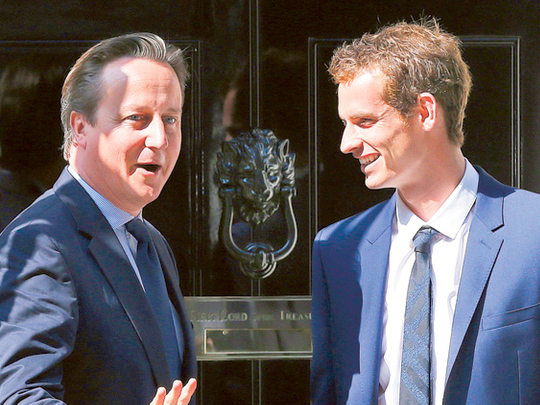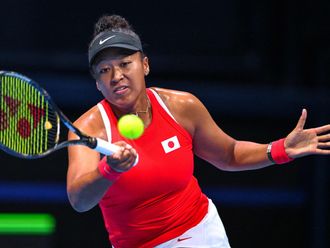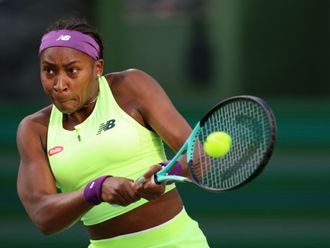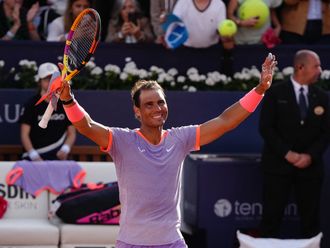
London: If Andy Murray were to be knighted for winning Wimbledon once — and the bookmakers already say it is odds-on — an obvious question arises: What honour can be bestowed on him if he wins the title again, or a third, fourth or even fifth time? Prime minister, perhaps.
The disproportionality of suggesting a knighthood for a 26-year-old tennis player with at least four or five years of his career left and whose victories in grand slams do not yet match those of his immediate peers should appear obvious to anyone but a politician tripping over himself to bathe in the reflected glow of a magnificent sporting achievement.
It was, of course, one viewed live on the BBC on a warm, feelgood Sunday afternoon by 17.2m people, many of whom will play a part in deciding if David Cameron is still in a job in two years’ time.
The instant reaction to his instant reaction has been largely positive. It would be churlish to disagree, surely — and unpopular. As he stood in the Rose Garden at 10 Downing Street chatting happily with the new champion on Monday, David Cameron was joined by his deputy Nick Clegg and the Labour leader Ed Miliband. The cameras clicked. The story got better and better. This was a party nobody wanted to spoil.
Yet Murray’s winning the US Open in the middle of the night in New York last September, apparently, did not sufficiently excite the PM’s advisers to get him to call on the Queen to dub young Andy. Too far away? Not on prime time television here? No pending European election?
Last Sunday’s final was more than a tennis match. It was a national event, memorable and heart-warming in its own right but also a cleansing of some perceived universal guilt for not having a player good enough to win the men’s singles title at this country’s own tournament for the past 77 years.
It took an American to point out at the post-match press conference that Murray was the first British player to win Wimbledon in shorts.
Cameron was not responding to just the achievement but how it was playing to a wider international audience, not to mention the electorate. However, giving Murray a knighthood would be wrong for two reasons: it is way too early and it might well undermine his tennis.
What effect, for instance, will being announced on court everywhere from Melbourne to Paris to London to New York as Sir Andrew Murray have on this essentially shy and private young man, not to mention his opponents, none of whom from outside the Commonwealth lives in a society obsessed with such things?
The locker-room exchanges would be interesting, at least. Also, there is no guarantee, as Murray points out, that he will win another major. “Winning Wimbledon is an incredibly tough thing to do,” he said after doing that incredibly tough thing for the first time in eight attempts.
This ill-considered rush to venerate is a relatively new phenomenon, and littered with inconsistencies. Jack Hobbs, one of cricket’s greatest batsmen and probably England’s finest, was not knighted until 1953, fully 23 years after he had played his final Test match. Roger Bannister, who broke the four-minute mile a year after Hobbs’s investiture, did not receive his knighthood until 1975.
Henry Cooper, although he never won a world title, retired in 1971 so loved he lingered on our screens for years selling sauce with Frank Bruno, and became boxing’s only knight in 2000. Bruno, who did win the world heavyweight title, has had no call to Buckingham Palace since his MBE in 1990. Likewise the former world champion Lennox Lewis, CM, MBE, a considerably better British heavyweight than either Cooper or Bruno.
And what of Sir Steve Redgrave, the greatest rower of all time, who remained plain Steve until a year into his retirement, after he had won his fifth Olympic gold medal in Sydney in 2000?
We live now, though, in a Twitterstorm of instant response, almost ravenous consumption, change and gratification. The gap between deed and celebration shrinks by, well, the second.
The fever started in 2005, when there were gongs all round (although no knighthoods) at the first opportunity for members of the England cricket team who won the Ashes back after a barren spell of a mere 18 years, prompting much derision by the Australians on the subsequent tour, which they won 5-0.
Sir Chris Hoy, unquestionably worthy of the highest recognition for his cycling deeds, was anointed in 2009 — three years before he retired. The Queen waited just a year into Kelly Holmes’s retirement before making that wonderful Olympic middle-distance runner a dame in 2005.
Murray acknowledges it would be a great honour to be knighted — but maybe not just yet. As he put it when advised of the Prime Minister’s remarks: “I don’t know if it merits that.”
Perspective and candour have defined Murray’s tennis career. They are qualities politicians say they value above most others. And they are, of course, honourable men.












